From 10 to 15 Different Types of Doctors on My Healthcare Team
I was reading this post the other day, and realised that I had originally written it 10 years ago. Back then, I was 'only' seeing around 10 different types of doctors on a regular basis.
Now, the body count has increased to 15 - which excludes other healthcare professionals who aren't technically considered doctors, but still important players on my medical team (such as my dietitian and physiotherapist). Then there's also the other medical specialists I see on a less frequent basis. Needless to say, I had to update the post.
*Disclaimer: This article is meant for educational purposes, and is based on my personal experiences as a patient. Whilst I have done my best to be meticulous in research, I am not a doctor, and nothing in this article should be substituted for medical advice. Please consult your own doctor before changing or adding any new treatment protocols. This post may also contain affiliate links. It will cost you nothing to click on them. I will get a small referral fee from purchases you make, which helps with the maintenance of this blog. Read our Privacy Policy page for more information. Thank you!
Pin to Your Different Types of Doctors & Chronic Illness Boards:
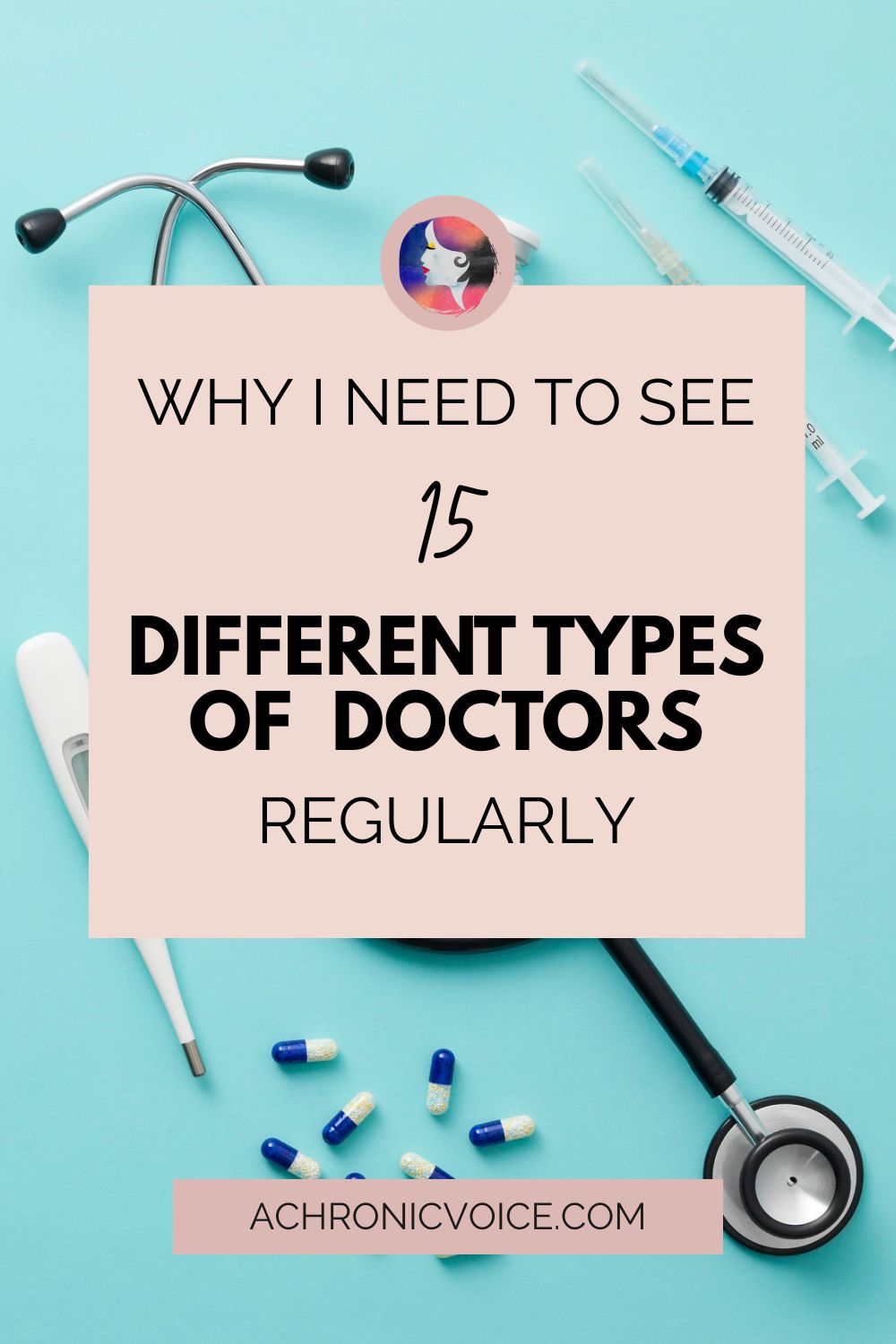

The Complexity of Autoimmune Diseases
Autoimmune diseases are a complex beast (Global Autoimmune Institute [GAI], n.d.); like a hydra with poisonous heads that have the ability to regenerate and multiply as comorbidities. No two patients are the same; we share the same illness only by namesake.
There is no go-to medication to treat them, such as antibiotics for a common flu. Every patient's cocktail of drugs is obtained from years of trial and error, and also with much blood, sweat and tears. More often than not, such patients need to see many different types of doctors, due to the systemic nature of many autoimmune diseases (Shi et al., 2013). Personally, I need to see at least 15 different types of doctors on a regular basis.
Is There Really a Need to See That Many Different Types of Doctors?
As you well may know, the body operates as one unit. A dysfunction in one system can impact another, whether as a direct or indirect consequence. For instance, many autoimmune diseases manifest as problems within the oral cavity first (Saccucci et al., 2018), which may seem totally unrelated at first glance.
Various medical departments contribute their expertise to manage these symptoms as a whole. Following up with only one doctor is usually insufficient, even if they're knowledgeable within their specialty.
So for those who are wondering why we're scurrying off for yet another appointment (didn't she just see her doctor last week?!), or were curious as to what purpose each different type of doctor serves, here's a little peek into our lives.
1. Rheumatologist - My Most Important Doctor
Out of all the different types of doctors, my rheumatologist (American College of Rheumatology [ACR], n.d.) is hands down the most important specialist on my healthcare team. You probably have a go to primary care physician (PCP)/general practitioner (GP) whom you visit whenever you feel ill. For me, the equivalent is my rheumatologist.
This is because I have so many autoimmune diseases and comorbidities that are beyond what a GP can help me with. In fact, I hardly visit GPs anymore unless I know what I need from them specifically, such as medications for a cough. Otherwise, they usually just direct me to the nearest A&E out of fear.
What My Rheumatologist Helps Me with Specifically
My rheumatologist takes care of my autoimmune conditions together with me, namely Systemic Lupus Erythematosus (Lupus), Sjögren's disease and Antiphospholipid Syndrome. I see him the most frequently out of all my doctors, as we need to ensure that both the symptoms of these diseases, and also the medication side effects are all under control. Or as close to 'under control' as we can get them to be.
He is also the doctor who refers me to other specialists, should he suspect the involvement of a particular organ, or detects other problems. Perhaps he heard some unusual sounds gurgling in my heart, or found a mysterious lump on my foot. He then refers me to a cardiologist or foot surgeon respectively for further investigation.
2. Cardiologist (Heart Doctor)
Cardiologists are doctors who take care of the heart and the blood vessels related to it. They treat a variety of diseases such as heart attacks, atherosclerosis, heart valve problems and more (Cleveland Clinic, 2024a).
My rheumatologist first referred me to a cardiologist after he detected strange sounds coming from my heart about 15 years ago. The cardiologist then ordered an echocardiogram, which is an ultrasound test for the heart (Mayo Clinic, 2024). We learned that the mitral valve in my heart had prolapsed, and that the sounds were a result of blood leaking back into my lungs (National Heart, Lung, and Blood Institute [NHLBI], 2022).
I eventually needed to get a mitral valve repair (MVR) done at Cleveland Clinic in the U.S., as I was getting progressively breathless over a year. The repair was done using an annuloplasty band that's made of gore-tex material (Cleveland Clinic, 2021). I've had to see a cardiologist on a regular basis ever since, to monitor for any changes or new problems with my heart. (P.s. 15 years later, I now have mitral valve stenosis (Cleveland Clinic, 2023b), which will eventually require an open heart surgery).
3. Heart Rhythm Specialist
Yes, I see two different types of doctors for my heart, who look after different aspects of the same organ. You may be surprised at how fine-grained all the different medical specialties can be!
And no, heart rhythms are not something my cardiologist knows too much about. It isn't because she is stupid; they are just a whole new ball game from heart valves. I guess you could view the cardiologist as a mechanic, and the heart rhythm specialist as an electrician. It is like the difference between the science of measuring electric currents, versus operation of the actual machine itself.
The mitral valve prolapse (MVP) I had probably led to the heart rhythm disorder/arrhythmia (Mayo Clinic, 2023). I have something called paroxysmal supraventricular tachycardia (PSVT), which causes my heartbeat to accelerate out of control when it falls into a wrong loop.
4. Neurologist (Brain Doctor)
About a year after I was first diagnosed with Lupus, I was diagnosed with epilepsy, which is a neurological disorder that causes abnormalities in brain waves, which then trigger seizures (Epilepsy Foundation, n.d.). I was officially diagnosed with epilepsy after undergoing an electroencephalogram (EEG) test, which measures brain waves (Johns Hopkins Medicine, 2024).
Whilst the neurologist (University of Utah Health, 2021) claims that my epilepsy isn't related to my other chronic illnesses, I personally think that all my illnesses are connected or impact each other in one way or another. Out of all the medical specialisations, I have found neurology to require the most guess work as well, which just goes to show how much we still don't know about this super important organ.
What usually happens during my appointments with my neurologist is that I update him on my latest brain-related symptoms. This might be extra brain fog, visual field auras (Spencer, 2015), giddy spells brought about by buzzing sounds, or something else.
He then makes a conclusion based on my word, and adjusts my medications as needed. From there it is a waiting game until the next appointment, and the next. You need to be incident-free for at least two years before medications can be reduced, or subsequently stopped. I have yet to be off my medications after 15 years, as I still experience visual field auras on a weekly basis.
Pin to Your Chronic Illness & Healthcare Boards:
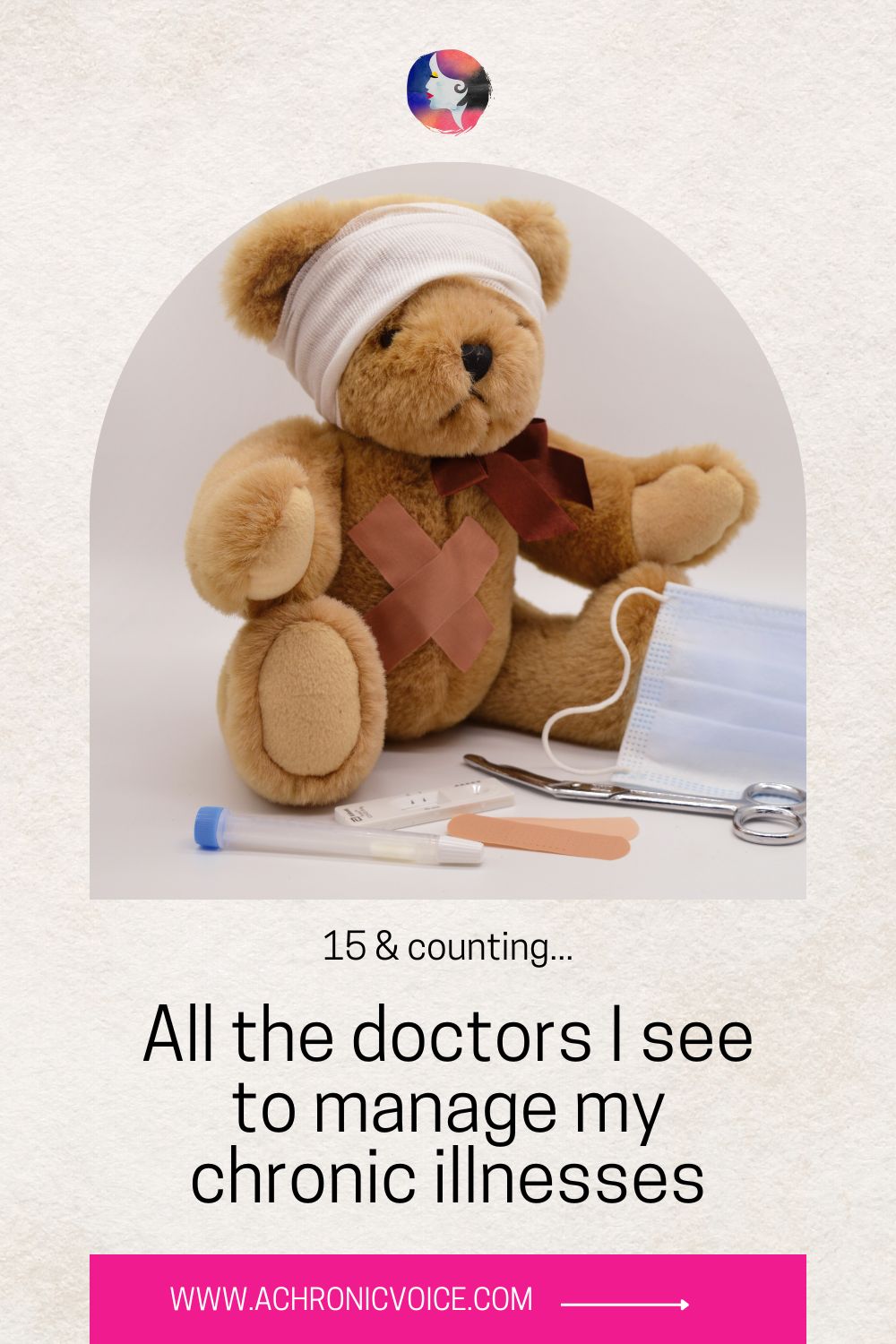
5. Psychiatrist (Mental Health Specialist)
I first started seeing a psychiatrist (American Psychiatric Association, 2023) after I begged my doctor to refer me to one about a decade ago. My steroid medications give me anxiety, but for the most part I just bore with it. I reached a breaking point when I caught tuberculosis (TB) however, as they had to double my steroid dose due to interactions with the TB meds.
The 30 pills I was taking every day wreaked unspeakable havoc on my mind and body. It also worsened my heart rhythm disorder, so I had to rush to the A&E every few days. I hardly saw anyone except hospital and medical staff for a year.
I was diagnosed with clinical depression and anxiety by the psychiatrist, which stemmed from both the TB and long-term steroid usage. I believe the chronic pain I experienced over the years was starting to take a heavy mental toll, too. She started me on an antidepressants which I need to take on a daily basis. She also gave me some 'emergency medications' for acute bouts of panic attacks.
More on How the Psychiatrist has Helped Me
If you live with chronic pain and have been wondering if you should see a psychiatrist (or another mental health professional) or not, the answer from me is a resounding "yes". Before I was put on antidepressants, I had no idea how out-of-whack my brain was, and that there were actually solutions. Whilst the medications do not remove the depression, anxiety or pain entirely, I have managed to return to a functional level because of them.
I actually don't see the mental health problems going away anytime soon, so I will need to see my psychiatrist regularly, too. In addition, she works in tandem with my neurologist, as some of the medications used can overlap with those for epilepsy.
6. Psychologist (Another Type of Mental Health Specialist)
Different states and countries have different requirements to be a clinical psychologist (Browne & Smith, 2019), so I'm just going to include them here on the list of different types of doctors I see.
Even though I was seeing a psychiatrist, I was curious as to what the difference was as compared to a psychologist (American Psychological Association, 2013). I wanted to know which specialty was more suited to my needs. What I learned instead is that a psychiatrist and psychologist have very different skill sets. Whilst they both deal with mental health issues, their approach and scope is very different.
I came to realise that I needed both a psychologist and psychiatrist on my healthcare team for that period of time. The psychiatric medications I was on helped to staunch the so-called 'mental wounds and infections', whereas the counseling sessions were the balm that soothed it, and aided with recovery.
I found the counseling sessions so helpful that I continued to see my psychologist on a monthly basis for quite some time, even after she told me that I didn't need her help anymore. Whilst I haven't seen a psychologist in years, I might be booking an appointment with a new one again soon. A myriad of new chronic illnesses and disabilities have pushed me to a new breaking point, one which I am having trouble coping with on all levels - physical, mental and emotional.
7. Gynaecologist (for General Women's Health)
I truly wish that I were seeing a gynaecologist for pregnancy reasons, but unfortunately, it's because I've had two deadly ovarian cyst ruptures, no thanks to the medications I take for Antiphospholipid Syndrome. I met my current gynaecologist - who is a high-risk gynaecologist - in the hospital ward, after one of these near-death episodes.
Now, I have a birth control implant in my arm to prevent further episodes. These need to be changed only every 3 years, but I do see her more frequently than that as she also does my PAP smear and other tests related to women's health.
8. Gynaecologic Oncologist (Cancer Specialist for Women's Health)
I was going for regular check ups with another gynaecologist (Gynaecologist Singapore, n.d.) previously, and had two dilation and curettage (D&C) procedures (Cooper & Menefee, 2023) done by her. (Needless to say, the jobs were poorly done, so I am seeing the other gynaecologist mentioned above instead now.)
Anyway, she sent me to a gynaecologic cancer specialist (Cleveland Clinic, n.d.), after we discovered two different types of precancerous cells that had spread all over my female reproductive system. It was critical to get checked asap as I was on immunosuppressants, meaning that the cells could spread more easily as compared to a healthy person.
The gynaecologic oncologist proceeded to cauterise these precancerous cells - both in my cervix (National Cancer Institute [NCI], n.d.), and on the surface of my skin (Cancer Research UK, 2023). I still need to follow up with him on a fairly regular basis, to ensure that these precancerous cells are not making a comeback.
On a side note, the original advice from my previous gynaecologist was to cut out my entire cervix. I was strongly against this, but am grateful that she was willing to put me in contact with someone else still. Bottom line is - always seek a second opinion before doing anything drastic. Different doctors even within the same specialty can have pretty extreme opinions; find one whom your research and gut instinct sits well with.
9. Ophthalmologist (Eye Doctor)
Ophthalmologists are medical doctors who "specialize in eye and vision care". They diagnose and treat various eye diseases and vision disorders, and also perform eye surgery if needed (Churchill & Gudgel, 2025).
I need to see an ophthalmologist on a yearly basis, as the medications I take to control the Lupus and Sjögren's can cause blindness, especially hydroxychloroquine. The medications can also lead to other eye problems such as cataracts and visual field defects (Hansen & Schuman, 2011).
I also have this "blind spot" in my left eye, which happened after the pulmonary embolism and multiple DVTs episode I had when I was 17. Whilst the ophthalmologist asks me every year if the blind spot is still there, they have yet to identify a problem within the eye itself, which leads me to believe that it is an injury within the brain of some sort.
They dilate your pupils with some eye drops during these eye checks so that they can examine them properly (American Association for Pediatric Ophthalmology & Strabismus [AAPOS], 2023). It is impossible to go back to work for up to 6 hours after even if I wanted to, as everything on my screen becomes too bright and fuzzy.
10. Dentist
Salivary Gland Issues with Sjögren's Disease
Whilst we should all see our dentists on a regular basis (National Commission on Recognition of Dental Specialties and Certifying Boards [NCRDSCB], n.d.), it is extra important for those of us with Sjögren's disease, as our salivary glands can dry out (National Institute of Arthritis and Musculoskeletal and Skin Diseases [NIAMS], 2024).
Apart from its role in lubrication and breaking food particles down, natural saliva also contains certain enzymes that has anti-infective properties (Tiwari, 2011). A dry mouth can lead to bacterial or viral infections, which then leads to gum or tooth decay if left untreated.
During bad flares from Sjögren's disease, I need to constantly rinse my mouth with Oral 7 moisturising mouthwash. I also smear the Oral 7 mouth gel all over the insides of my mouth before sleeping, which acts as a protective coating in place of natural saliva. It also lends brief relief from the discomfort of dryness, which can be more painful than you would imagine.
TMJ Disorder & Sleep Bruxism Issues
Apart from reasons related to Sjögren's disease, I also need to see my dentist for TMJ disorder and sleep bruxism (teeth grinding) issues (Nourish Dental Sleep & TMJ Care [NDC], 2025).
I have managed to break my molar tooth from bruxism before, and broke it again recently whilst chewing on some Christmas ham. Because of these issues, I had to have a customised mouth guard made by my dentist. I need to wear this to sleep every night to prevent yet more damage to my teeth. Fun times.
Pin to Your Different Types of Doctors & Chronic Illness Boards:
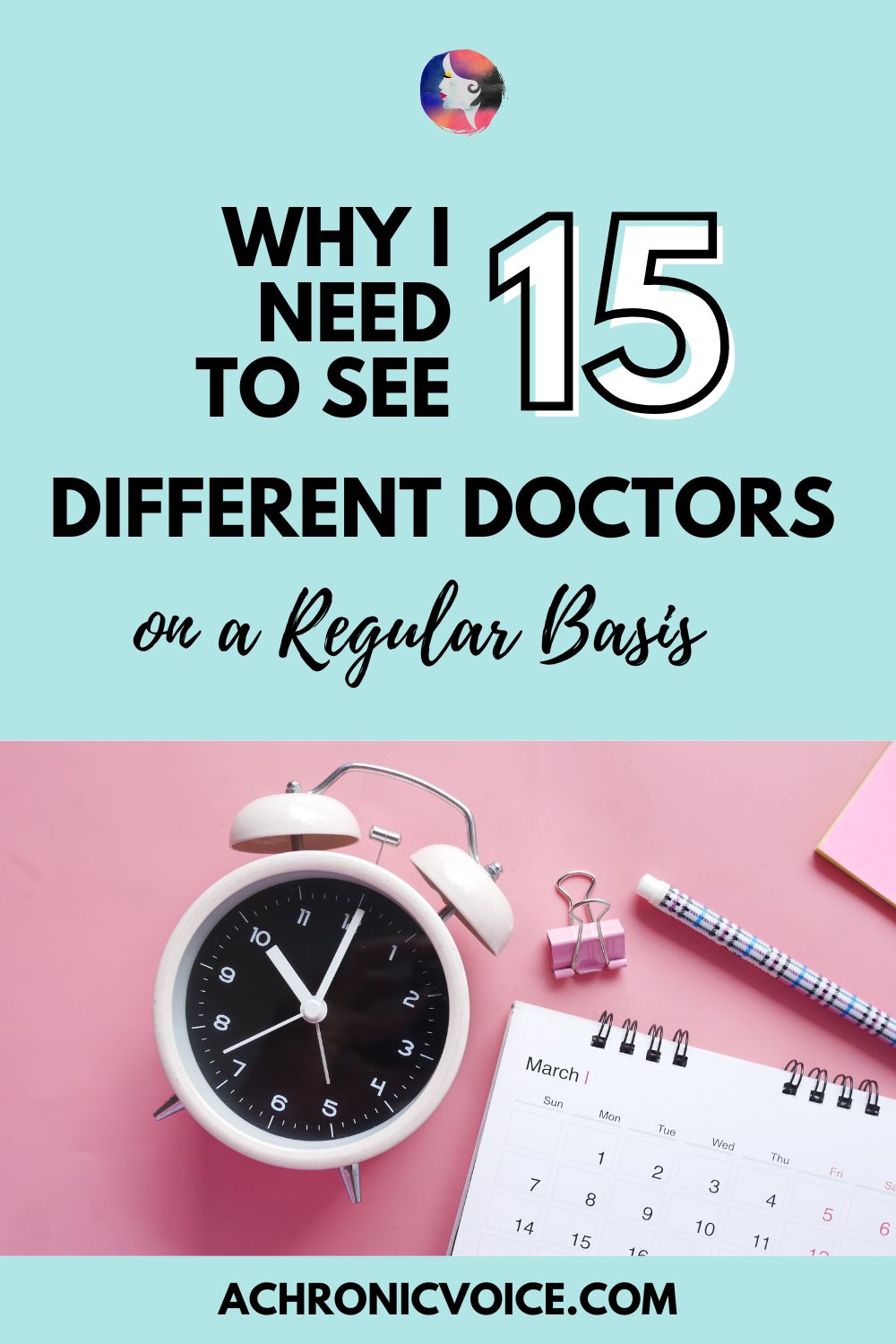
11. Orthopaedic Surgeon (Sports Medicine)
I don't have to explain to you by now, but there are also a ton of specialties under orthopaedics (American Board of Orthopaedic Surgery [ABOS], n.d.). As a whole, they take care of the musculoskeletal system, which includes muscles, bones, tendons, ligaments, joints and other bits and pieces (Villa-Forte, 2025).
Orthopaedic surgeons tend to specialise on one particular area of the body; for example, the hand versus the feet or ankle. Ironically, my orthopaedic surgeon specialises in sports medicine, even though chronic illness and disability has made me less active. This is because sports injuries can be pretty violent, and my knees broke pretty violently by themselves. The incident rendered me disabled overnight, and left me bed bound for a year.
Whilst I need to see my orthopaedic surgeon on a less frequent basis now, he is still on my emergency to-dial list because my disabilities are kind of permanent. I can't squat or run anymore, and my knees feel like wooden blocks.
12. Upper Gastrointestinal Surgeon
Gastrointestinal issues are a whole new minefield for me, one that I have no clue how to navigate yet. Like with many other chronic conditions, and like what the upper GI doctor said, symptoms and treatments are highly individual.
I recently had esophageal surgery done to 'fix' my esophageal diverticula issues that were causing regurgitation whilst sleeping. Unfortunately, the surgery seems to have opened new cans of worms. I now have Dumping Syndrome (Hui & Bauza, 2023), which affects the lower part of my digestive system, and also severe acid reflux (Pope, 1994), where I throw up non-stop at night.
It also seems like there isn't much they can do for me, except to add more medications to my already long list of daily medications. I am still experimenting with foods and medication dosages to see what works. This process can sometimes cause more pain, but I don't have any other choice but to try and figure it out.
13. Colorectal Surgeon / Proctologist
Of all the clinics I have been to, this tends to be the one packed with the oldest folks. I first saw a colorectal surgeon (Cleveland Clinic, 2022) at the hospital for chronic rectal bleeding (Sabry & Sood, 2023) and haemorrhoids (Harvard Health Publishing, 2025). Visits tend to be quick (although you wait for hours) - a finger or tube up your bum, and he's done.
I also see a private colorectal specialist on the side, because when I get symptoms the pain is acute, and I need pain relief like yesterday. My private colorectal specialist also made some calls and we managed to get a biopsy done at the same time as my esophageal surgery. It was a good thing that we did, because we learned that I have AIN 3, which are precancerous cells (Cancer Research UK, 2025).
This means that I will definitely need to get surgery done at some point to remove them. It also means that I probably need to see a colorectal surgeon for life, to ensure that they don't recur.
14. Respiratory Medicine Doctor / Pulmonologist
I see a pulmonologist (Kimble, 2019) for several reasons. I have scarring in my lungs from various medical incidents - the pulmonary embolism at 17, the bout of tuberculosis, and also from chest tube insertions and lung infections due to various surgeries.
I follow up with the respiratory medicine department on a fairly regular basis now, to ensure that any current defects are not becoming abnormal. Or more abnormal.
15. Infectious Disease Specialist
Infectious disease doctors specialise in diseases that can spread to others. This includes a wide range of diseases, including but not limited to: HIV, measles, tuberculosis, COVID-19, and certain bacterial infections (Cleveland Clinic, 2023a).
I need to follow up with my infectious disease specialist on a fairly regular basis, just to monitor certain latent but permanent illnesses. (Don't worry, they're not that easily spreadable or they would have locked me up by now.)
Other Healthcare Specialists Who are Not Doctors (But Still a Vital Part of My Healthcare Team)
16. Rheumatology Nurse Clinician
My rheumatology nurse clinician works in tandem with my rheumatologist, and does a lot of work behind the scenes. These nurses follow up on problems of a smaller scale, or of a more predictable or routine nature. For example, I always see my rheumatology nurse clinician before and after surgeries to titrate my warfarin and clexane doses (anticoagulant medications).
17. Physiotherapist
Physiotherapists are not medical doctors, but they do work closely with various surgical departments in order to rehabilitate patients. I was only allowed to start physiotherapy 6 weeks after the knee surgery, and by then most of my leg muscles had already wasted away.
Increasingly, patients who are going for planned surgeries need to go for prehabilitation, too. The physiotherapy's role is to help the patient build up their strength with the aim of a faster recovery post surgery (Gillis et al., 2022). I last saw a physiotherapist for this reason a few months ago.
If I wanted to, I could probably request for a new referral to gain access to their specialised services and gym equipment needed to work out safely.
18. Dietitian
A dietitian (Cleveland Clinic, 2024b) is not a doctor, but they are still a key part of my healthcare team. My dietitian works with my upper GI doctor, with the combined aim of reducing my symptoms through dietary changes. They also monitor my weight to ensure that I am within a healthy range.
Personally, my dietitian has been more enlightening than my upper GI surgeon thus far, in terms of tips on how to manage the Dumping Syndrome and acid reflux issues. My surgeon simply prescribed medications 🤷🏻♀️
Pin to Your Healthcare & Patient Care Boards:

All the Other Different Types of Doctors I've Seen (and Might See Again)
As anyone with a chronic illness can testify, many of our symptoms can come and go in the blink of an eye. Often there is no explanation, and doctors are just as confused. The conclusion is always that it is an 'idiopathic condition', or a 'birth defect'.
As a result, I have seen hand surgeons, urologists, haematologists, sleep specialists (somnologists) and many other medical specialists. I have even sought out various doctors within the same field for second, third and forth opinions. It is amusing how much an opinion can cost, seeing that they are often unwanted on a regular day.
Apart from medical doctors, many patients with chronic illness and disabilities also need to work with other health-related specialists for various reasons. A few examples are: a physical therapist to help with pain management, or an occupational therapist to improve home accessibility.
Conclusion as to Why I Need to See So Many Different Types of Doctors
The next time someone says that they have a chronic illness or disability, know that they often see more than just one doctor. Medical appointments can feel like a full time job on some days, and eat into your entire day.
I've spent up to 6 hours just waiting for medical test reports, appointments and to collect medications. It's worse at the Accident & Emergency (A&E), where it can take days to get a bed should you need to be warded.
I hope that this post has been insightful as to why people with chronic illness and disability need to see so many different types of doctors on a regular basis. Each of our 'doctor mix' can also vary greatly. Some of us see the same type of specialist for different reasons, too. This goes to show just how complex both chronic illnesses and medical specialties can be.
Pin to Your Different Types of Doctors & Chronic Illness Boards:
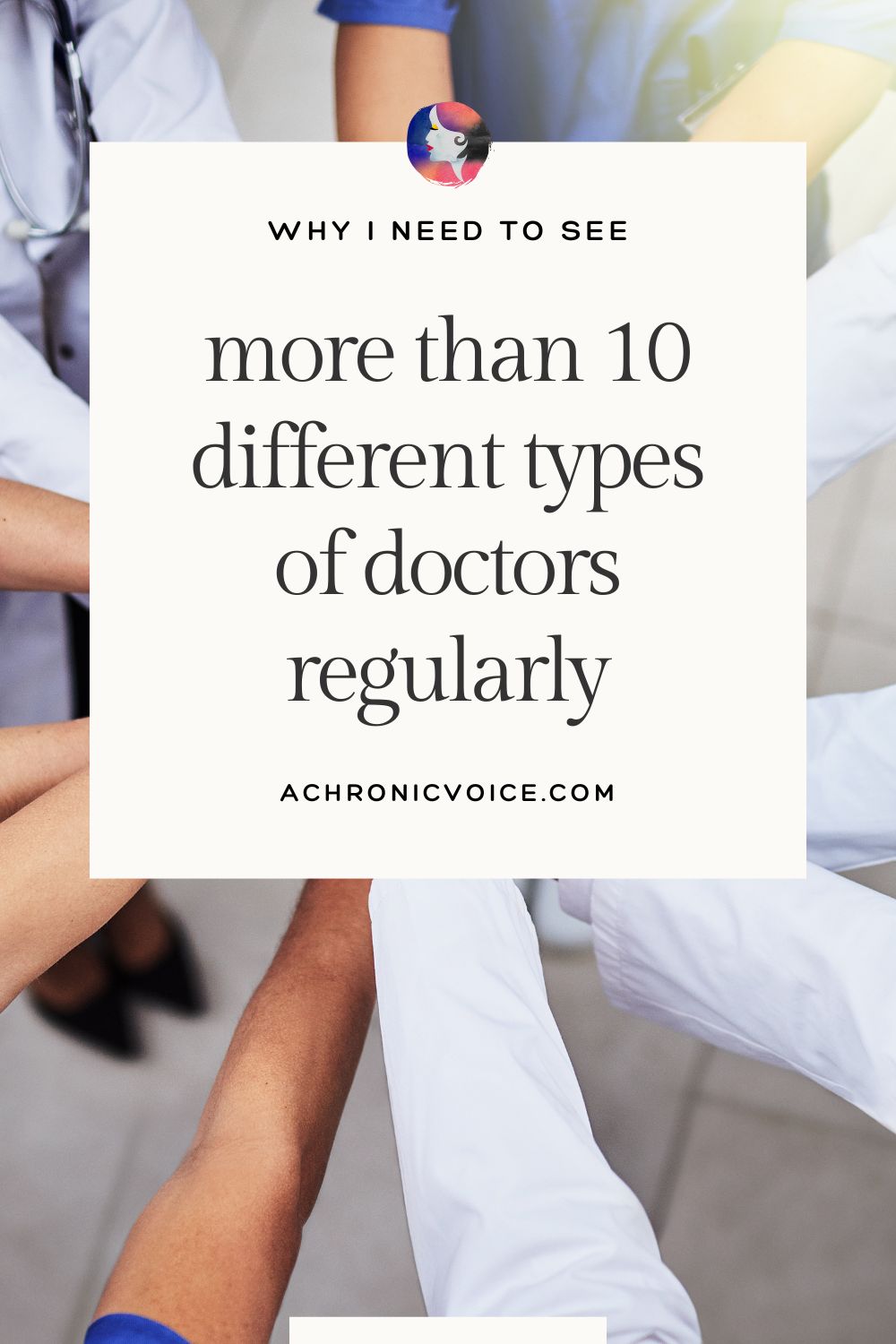
- American Association for Pediatric Ophthalmology & Strabismus. (2023, March). Dilating eye drops. https://aapos.org/browse/glossary/entry?GlossaryKey=37182552-8081-4f19-91a5-ee34f973bfdf
- American Board of Orthopaedic Surgery. (n.d.). Orthopaedics. Retrieved August 3, 2025, from https://www.abos.org/about/what-is-orthopaedics/
- American College of Rheumatology. (n.d.). Rheumatologist. Retrieved August 3, 2025, from https://rheumatology.org/rheumatologist
- American Psychiatric Association. (2023, January). What is psychiatry? https://www.psychiatry.org:443/patients-families/what-is-psychiatry
- American Psychological Association. (2013). Science of psychology. Https://Www.Apa.Org. https://www.apa.org/education-career/guide/science
- Browne, D. T., & Smith, J. A. (2019, April 11). Do you need a doctorate to be a clinical psychologist? Psychology Today. https://www.psychologytoday.com/sg/blog/why-family-matters/201904/do-you-need-doctorate-be-clinical-psychologist
- Cancer Research UK. (2023, February 23). Stages and grades of vulval cancer. https://www.cancerresearchuk.org/about-cancer/vulval-cancer/stages-types-grades/stages-grades
- Cancer Research UK. (2025, June 23). Anal intraepithelial neoplasia (AIN). https://www.cancerresearchuk.org/about-cancer/anal-cancer/stages-types/number-staging/stage-0-anal-intraepithelial-neoplasia
- Churchill, J., & Gudgel, D. T. (2025, July 24). What is an ophthalmologist vs optometrist? American Academy of Ophthalmology. https://www.aao.org/eye-health/tips-prevention/what-is-ophthalmologist
- Cleveland Clinic. (n.d.). Gynecologic oncology. Retrieved August 3, 2025, from https://my.clevelandclinic.org/departments/obgyn-womens-health/depts/gynecologic-oncology
- Cleveland Clinic. (2021, December 7). Annuloplasty. https://my.clevelandclinic.org/health/treatments/22224-annuloplasty
- Cleveland Clinic. (2022, November 2). Colorectal surgeon. https://my.clevelandclinic.org/health/articles/24409-colorectal-surgeon
- Cleveland Clinic. (2023a, May 30). Infectious disease doctor. https://my.clevelandclinic.org/health/articles/25022-infectious-disease-doctor
- Cleveland Clinic. (2023b, August 2). Mitral valve stenosis. https://my.clevelandclinic.org/health/diseases/21903-mitral-valve-stenosis
- Cleveland Clinic. (2024a, July 19). Cardiologist. https://my.clevelandclinic.org/health/articles/21983-cardiologist
- Cleveland Clinic. (2024b, December 19). Dietitian. https://my.clevelandclinic.org/health/articles/dietitian
- Cooper, D. B., & Menefee, G. W. (2023). Dilation and curettage. In StatPearls. StatPearls Publishing. http://www.ncbi.nlm.nih.gov/books/NBK568791/
- Epilepsy Foundation. (n.d.). What is epilepsy? Retrieved August 3, 2025, from https://www.epilepsy.com/what-is-epilepsy
- Gillis, C., Ljungqvist, O., & Carli, F. (2022). Prehabilitation, enhanced recovery after surgery, or both? A narrative review. British Journal of Anaesthesia, 128(3), 434–448. https://doi.org/10.1016/j.bja.2021.12.007
- Global Autoimmune Institute. (n.d.). Understanding autoimmune disease. Retrieved July 27, 2025, from https://www.autoimmuneinstitute.org/understanding-autoimmune-disease/
- Gynaecologist Singapore. (n.d.). Singapore gynaecologist directory. Retrieved August 3, 2025, from https://www.gynaecologist.sg/
- Hansen, & Schuman, S. G. (2011, June 1). Hydroxychloroquine-induced retinal toxicity. EyeNet Magazine. https://www.aao.org/eyenet/article/hydroxychloroquine-induced-retinal-toxicity?june-2011
- Harvard Health Publishing. (2025, February 7). Hemorrhoids and what to do about them. Harvard Medical School. https://www.health.harvard.edu/diseases-and-conditions/hemorrhoids_and_what_to_do_about_them
- Healthline. (2018, June 18). Salivary gland disorders. https://www.healthline.com/health/salivary-gland-disorders
- Hui, C., & Bauza, G. J. (2023). Dumping syndrome. In StatPearls. StatPearls Publishing. http://www.ncbi.nlm.nih.gov/books/NBK470542/
- Johns Hopkins Medicine. (2024, April 30). Electroencephalogram (EEG). https://www.hopkinsmedicine.org/health/treatment-tests-and-therapies/electroencephalogram-eeg
- Kimble, B. (2019, May 14). Know your providers: What does a pulmonologist do? American Lung Association. https://www.lung.org/blog/know-your-providers-pulmonologist
- Mayo Clinic. (2023, October 13). Heart arrhythmia. https://www.mayoclinic.org/diseases-conditions/heart-arrhythmia/symptoms-causes/syc-20350668
- Mayo Clinic. (2024, November 12). Echocardiogram. https://www.mayoclinic.org/tests-procedures/echocardiogram/about/pac-20393856
- National Cancer Institute. (n.d.). CIN 3. National Institutes of Health. Retrieved August 3, 2025, from https://www.cancer.gov/publications/dictionaries/cancer-terms/def/cin-3
- National Commission on Recognition of Dental Specialties and Certifying Boards. (n.d.). Recognized dental specialties. Retrieved August 3, 2025, from https://ncrdscb.ada.org/recognized-dental-specialties
- National Heart, Lung, and Blood Institute. (2022, March 24). What are heart valve diseases? National Institutes of Health. https://www.nhlbi.nih.gov/health/heart-valve-diseases
- National Institute of Arthritis and Musculoskeletal and Skin Diseases. (2024, June). Sjögren’s disease. National Institutes of Health. https://www.niams.nih.gov/health-topics/sjogrens-disease
- Nourish Dental Sleep & TMJ Care. (2025, March 3). Bruxism and obstructive sleep apnoea (with additional neuropathic pain) (case study #14). https://nourishdentalcare.com/bruxism-and-obstructive-sleep-apnoea-neuropathic-pain-case-study-14/
- Pope, C. E. (1994). Acid-reflux disorders. New England Journal of Medicine, 331(10), 656–660. https://doi.org/10.1056/NEJM199409083311007
- Sabry, A. O., & Sood, T. (2023). Rectal bleeding. In StatPearls. StatPearls Publishing. http://www.ncbi.nlm.nih.gov/books/NBK563143/
- Saccucci, M., Di Carlo, G., Bossù, M., Giovarruscio, F., Salucci, A., & Polimeni, A. (2018). Autoimmune diseases and their manifestations on oral cavity: Diagnosis and clinical management. Journal of Immunology Research, 2018(1), 6061825. https://doi.org/10.1155/2018/6061825
- Shi, G., Zhang, J., Zhang, Z. (Jason), & Zhang, X. (2013). Systemic autoimmune diseases. Journal of Immunology Research, 2013(1), 728574. https://doi.org/10.1155/2013/728574
- Spencer, D. (2015). Auras are frequent in patients with generalized epilepsy. Epilepsy Currents, 15(2), 75–77. https://doi.org/10.5698/1535-7597-15.2.75
- Tiwari, M. (2011). Science behind human saliva. Journal of Natural Science, Biology, and Medicine, 2(1), 53–58. https://doi.org/10.4103/0976-9668.82322
- University of Utah Health. (2021, April 6). When to see a neurologist. https://healthcare.utah.edu/neurosciences/neurology/neurologist
- Villa-Forte, A. (2025, January). Introduction to the biology of the musculoskeletal system. MSD Manual Consumer Version. https://www.msdmanuals.com/home/bone-joint-and-muscle-disorders/biology-of-the-musculoskeletal-system/introduction-to-the-biology-of-the-musculoskeletal-system

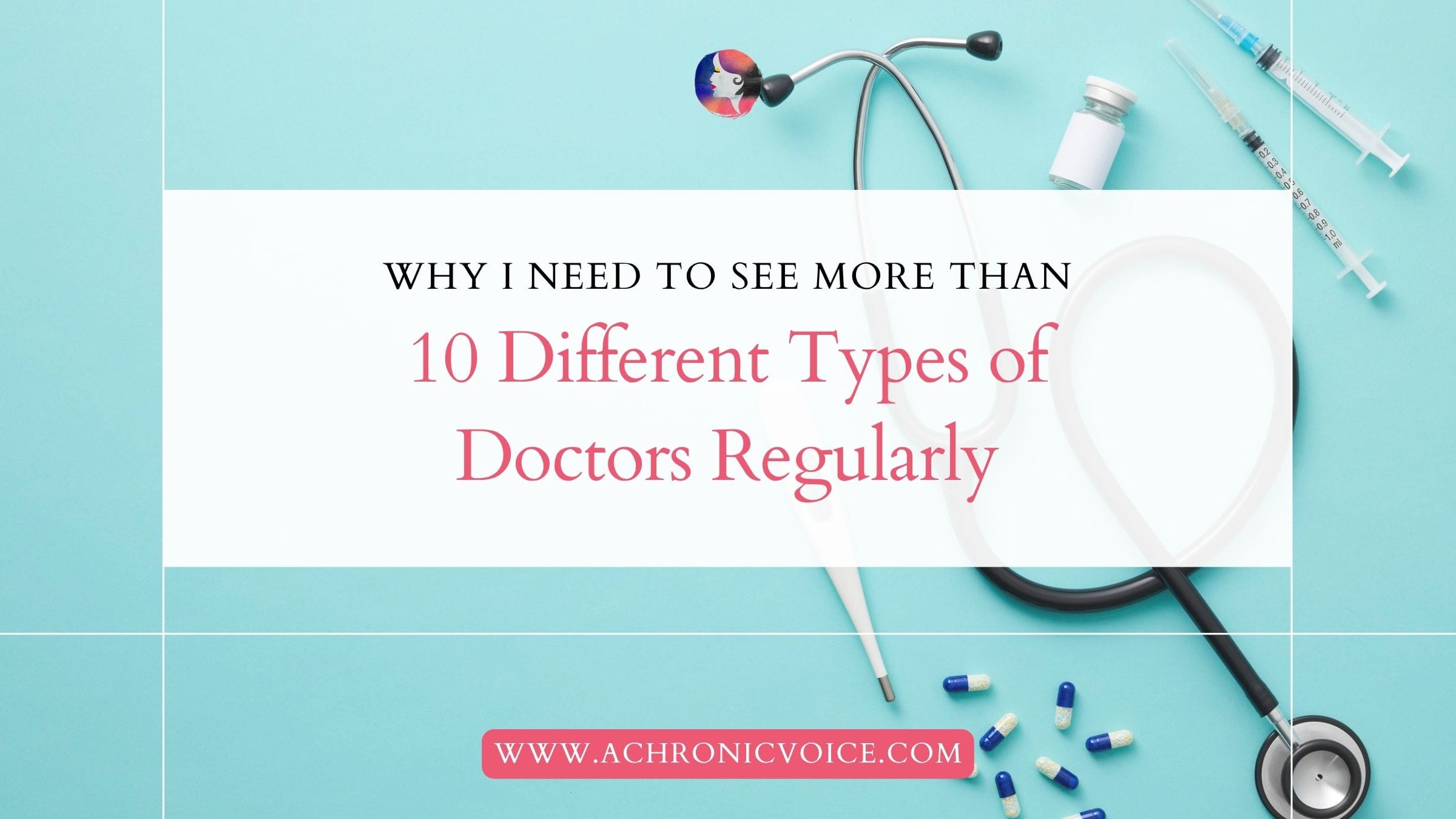

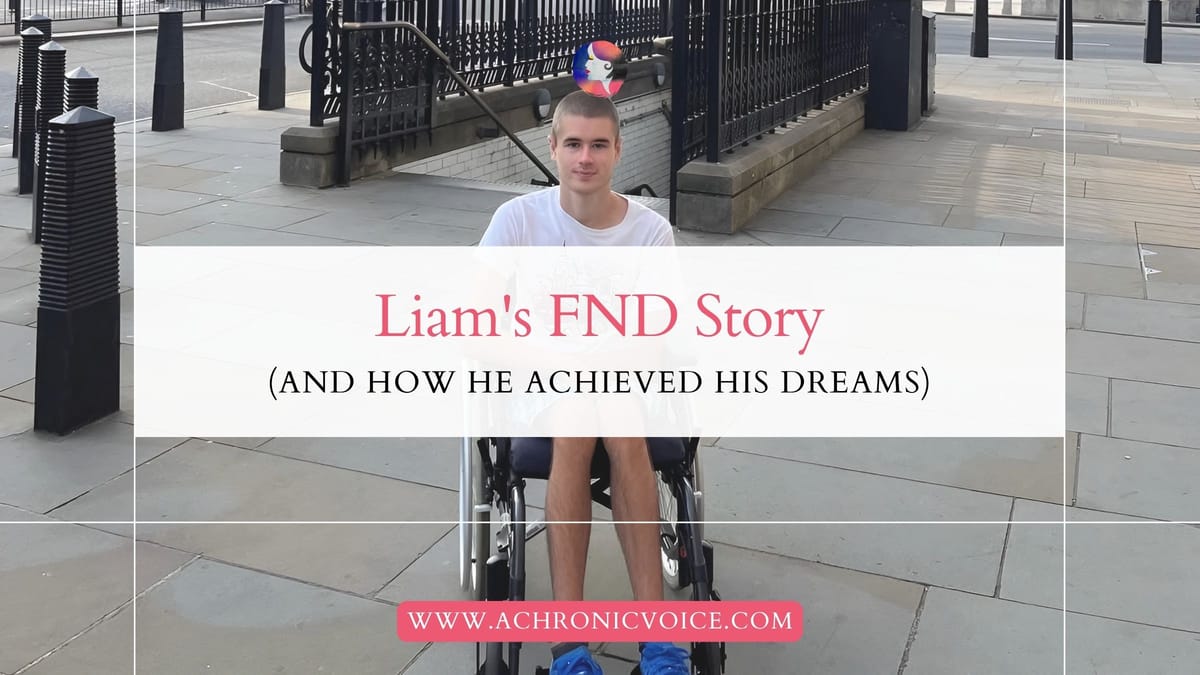


Comments Archives:
Comments imported from previous WordPress site.-
Carrie Kellenberger
-
Claire
-
Sheryl Chan
Start a new conversation in the Member Comments below!And this is what leads to full doctor burnout, which no one ever addresses or even thinks about...
Oh gosh yes. I also have a neurologist, two rheumatologists...
It’s crazy isn’t it! A time sucker, money sucker, energy sucker...